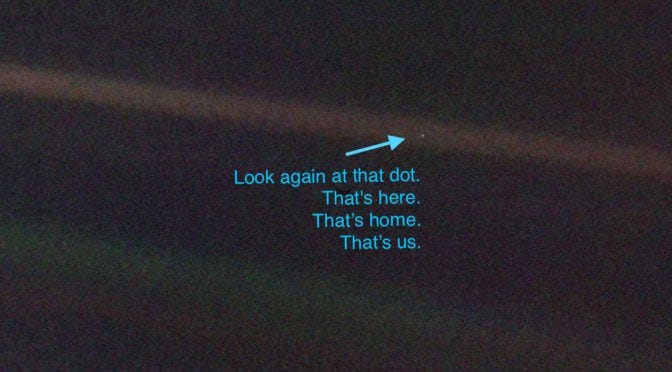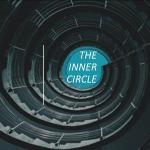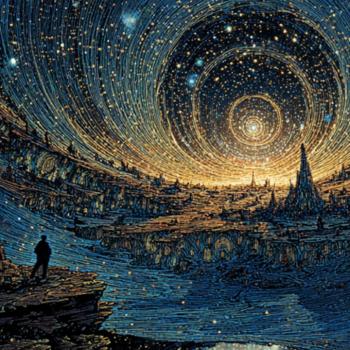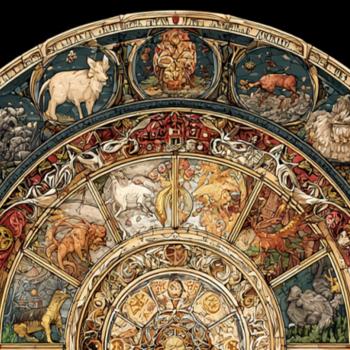
What if I told you I had the answer to all of humankind’s greatest problems? I’m talking, one single solution to end World Hunger, Poverty, War, Genocide, Homelessness, Political Partisanship, Nationalism, Racism, Homophobia, Mass Shootings, and everything else.
You’d probably call me crazy, or naive. Maybe you’d be curious enough to let me explain what I mean, but even once I did I’m sure you’d have your doubts and your objections as to why this solution wasn’t realistic or practical.
Still, if there really was one single solution that could put an end to these problems, wouldn’t you at least be interested in hearing what it was? Wouldn’t you want to find a way to share the answer with everyone, especially if it really had the potential to bring us world peace and harmony?
I’m old enough to remember a few years [decades?] ago when Elvis Costello asked the question, “What’s So Funny ‘Bout Peace, Love and Understanding?” and maybe that’s what I’m asking here, in my own way.
So, here’s what I think is the answer to everything. It’s found somewhere between the reality we find in the concepts of “Ubuntu” and “Namaste.”
In case you’re not familiar, let me explain:
Ubuntu is an African philosophy that supports collectivism over individualism. Ubuntu asserts that society gives human beings their humanity and is best summarized in the statement, “I am because you are.” This means that I have no identity apart from the community, and that community is not my tribe, or my race, or my political party; it’s the human race. It’s everyone, everywhere. So, Ubuntu encourages us to see ourselves and members of a collective that includes all people. My tribe is humanity. My home is planet earth. My worldview is that the world is everyone’s and everyone is the world’s.
I think one of the most beautiful expressions of this Ubuntu mindset is found in the words of the great scientist, Carl Sagan, who encouraged us to take a step back from our myopic individualistic view of ourselves and focus, instead, on our shared humanity on this “pale blue dot” we all inhabit together.
Here’s a snippet of that beautiful concept:

“Look again at that dot. That’s here. That’s home. That’s us. On it everyone you love, everyone you know, everyone you ever heard of, every human being who ever was, lived out their lives. The aggregate of our joy and suffering, thousands of confident religions, ideologies, and economic doctrines, every hunter and forager, every hero and coward, every creator and destroyer of civilization, every king and peasant, every young couple in love, every mother and father, hopeful child, inventor and explorer, every teacher of morals, every corrupt politician, every “superstar,” every “supreme leader,” every saint and sinner in the history of our species lived there–on a mote of dust suspended in a sunbeam.
“The Earth is a very small stage in a vast cosmic arena. Think of the rivers of blood spilled by all those generals and emperors so that, in glory and triumph, they could become the momentary masters of a fraction of a dot. Think of the endless cruelties visited by the inhabitants of one corner of this pixel on the scarcely distinguishable inhabitants of some other corner, how frequent their misunderstandings, how eager they are to kill one another, how fervent their hatreds.
“Our posturings, our imagined self-importance, the delusion that we have some privileged position in the Universe, are challenged by this point of pale light. Our planet is a lonely speck in the great enveloping cosmic dark. In our obscurity, in all this vastness, there is no hint that help will come from elsewhere to save us from ourselves.
“The Earth is the only world known so far to harbor life. There is nowhere else, at least in the near future, to which our species could migrate. Visit, yes. Settle, not yet. Like it or not, for the moment the Earth is where we make our stand.
“It has been said that astronomy is a humbling and character-building experience. There is perhaps no better demonstration of the folly of human conceits than this distant image of our tiny world. To me, it underscores our responsibility to deal more kindly with one another, and to preserve and cherish the pale blue dot, the only home we’ve ever known.”
— Carl Sagan, Pale Blue Dot, 1994
You can watch a moving video of Carl Sagan sharing the entire idea here:
So, that’s Ubuntu in a nutshell.
We are all human beings sharing this “pale blue dot” together, and our fighting, striving, arguing and divisiveness is pointless, foolish and a waste of our lives.
The other concept is “Namaste” which you may already be familiar with. The term is associated with both Hinduism and yoga and comes from a Sanskrit phrase which literally means “bowing to you” or “I bow to you,” and is used as a greeting. But, in a deeper sense, the meaning behind this greeting is this: “The Divine in me sees the Divine in you.”
Christians and followers of Jesus can affirm the notion that God is the Creator of all human life on planet earth. This means that God [the Divine] created human beings in God’s own image and so every single one of us bears the “Imago Dei” – the image of God.
The Apostle Paul affirmed this notion when he told the idol-worshipping Gentile pagans in Athens that God was their Father and that they were God’s children, even though they didn’t know God’s name and even though they didn’t believe in Jesus and the Christ, or confess their sins or pray a prayer of salvation, they – and therefore, everyone, everywhere – are God’s beloved children.
If we can truly grasp this we’ll see that every human being we encounter is made in God’s image, and that, as Jesus told us, whatever we do to even the least of God’s children, we do to God and to Christ. This means that the way we treat our fellow man is how we treat God. If we ignore the hunger of a hungry person, we are ignoring the hunger of Christ. If we fail to clothe the naked or shelter the homeless, we fail to clothe and provide shelter for God. If we ignore people who are suffering, we ignore God as well.
This is why I say that the answer to everything is found somewhere between the reality we see in the concepts of Ubuntu and Namaste. Because, if we really, truly believed and embraced these concepts, then it would be absolutely impossible for anyone to kill another human being. To do that would be to knowingly murder ourselves, and to murder God.
The reality of Ubuntu and Namaste would forever end poverty, homelessness and famine because none of us could bear to see God, our own children, brothers, sister, and family members suffer in this way.
The awareness of our oneness with all humanity and with the Divine would make War inconceivable, Mass Shootings unthinkable, Homophobia unimaginable, Racism preposterous, and all other tribalism absurd. We simply couldn’t bring ourselves to de-humanize another human who we truly believed was as valuable, beautiful and precious as they really are.
Now, as predicted above, you might think this is wishful thinking, or naively optimistic. But, to me, this is exactly what Jesus was trying to get us to see. This is the heart of the Gospel itself: “You are not separated from God because the Kingdom [dwelling place] of God is within you.”
If the dwelling place of God is within every one of us, then we are all the Temple of God’s presence. Who among us could desecrate God’s holy temple?
If the image of God is tattooed across every human face and heart, then who could abuse or do violence to that face or that heart?
If every human being we encounter is one with us, and if we are one with them, then how could we harm our own family or allow them to suffer?
I can hear the “but what about…?” comments brewing already. Yes, I know, people harm their children, and hurt their family, and even do violence to themselves. I get that. But, I think if everyone knew deep down in their heart and truly embraced at their core of their being their own Divinity, and the basic shared Humanity and Divine presence of everyone else, such violence and abuse would be nearly impossible for most of us.
So, I don’t know about you, but for me, the more I meditate on those two concepts of “Ubuntu” [I am because you are], and “Namaste” [The Divine in me sees the Divine in you], the more I notice this shifting within my own heart and mind towards greater love for humanity and less tolerance for the “Us/Them” illusion that keeps us constantly divided from one another.
For me, the answer to everything is this: I am because you are, and the Divine in me sees the Divine in you.”
This is how we truly learn how to love our neighbor, and even our enemies, the way Jesus did. This is how we can feed the poor, care for the outcast, turn the other cheek, and study war no more.
The answer to everything is so simple. The only question is: when will we decide to live it out?
**
Keith Giles is the best-selling author of the Jesus Un series. He has appeared on CNN, USA Today, BuzzFeed, and John Fugelsang’s “Tell Me Everything.” He hosts the Second Cup with Keith podcast, and co-hosts the Apostates Anonymous podcast, and the Heretic Happy Hour Podcast.
His latest book, SOLA DEUS: What If God Is All Of Us? is available now on Amazon in Paperback and Kindle HERE>
Find out more about online courses HERE>













